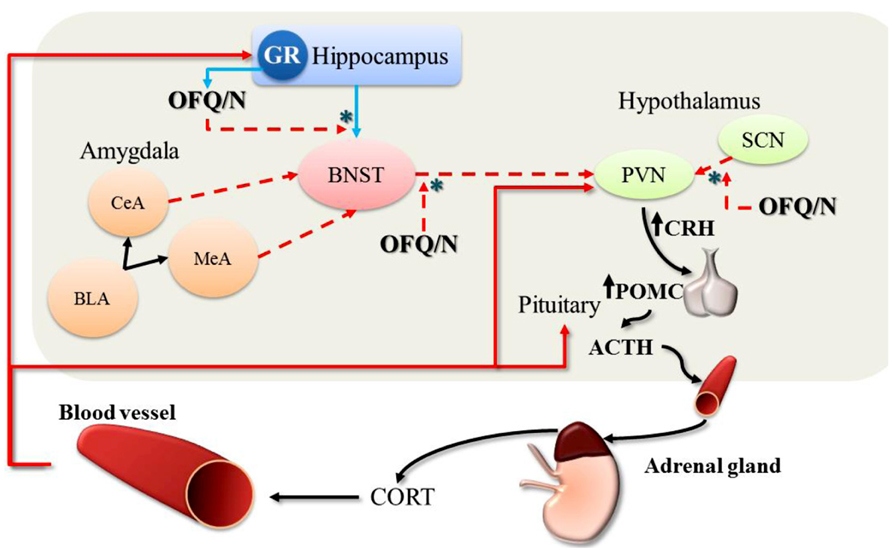trainman04
Bluelighter
- Joined
- Dec 18, 2017
- Messages
- 189
The stress-response is classically divided into three categories: behavioral, autonomic, and hormonal responses.
CRH is believed to be involved in all three stress-responses, involving different brain regions [R].
CRH causes fear and anxiety [R, R] (via CRHR1[R]) and major depression [R]. CRH promotes anxiety in part by reducing cannabinoids in our amygdala.
This happens when CRH (CRHR1) increases FAAH in the amygdala, which causes a reduction in the endocannabinoid anandamide (AEA) [R].
CRH production takes place in the cerebral cortex, limbic system, cerebellum, locus coeruleus of the brain stem, and dorsal root neurons of the spinal cord.
Cortisol/Glucocorticoids inhibit CRH production in the hypothalamus. However, in the amygdala – a brain region involved in the behavioral stress response – cortisol increases CRH, leading to anxiety and fear [R].
Chronic stress increases CRH by decreasing negative feedback. CRH will not be inhibited by cortisol like it normally should [R].
Normally, after CRH is released, there’s also a spike in ACTH and cortisol, which feeds back to reduce CRH if you aren’t ‘resistant’ or ‘insensitive’ to the negative feedback from cortisol.
But if this negative feedback isn’t solid because of chronic stress and genetics then cortisol won’t reduce CRH by as much as it should.
This will occur when the cortisol (glucocorticoid) receptors aren’t functioning right. The result is too much CRH.
The other problem people have is when CRH doesn’t produce enough cortisol, so more CRH has to be produced for a given amount of cortisol [R].
In both cases, excess CRH is produced.
from selfhacked
CRH is believed to be involved in all three stress-responses, involving different brain regions [R].
CRH causes fear and anxiety [R, R] (via CRHR1[R]) and major depression [R]. CRH promotes anxiety in part by reducing cannabinoids in our amygdala.
This happens when CRH (CRHR1) increases FAAH in the amygdala, which causes a reduction in the endocannabinoid anandamide (AEA) [R].
CRH production takes place in the cerebral cortex, limbic system, cerebellum, locus coeruleus of the brain stem, and dorsal root neurons of the spinal cord.
Cortisol/Glucocorticoids inhibit CRH production in the hypothalamus. However, in the amygdala – a brain region involved in the behavioral stress response – cortisol increases CRH, leading to anxiety and fear [R].
Chronic stress increases CRH by decreasing negative feedback. CRH will not be inhibited by cortisol like it normally should [R].
Normally, after CRH is released, there’s also a spike in ACTH and cortisol, which feeds back to reduce CRH if you aren’t ‘resistant’ or ‘insensitive’ to the negative feedback from cortisol.
But if this negative feedback isn’t solid because of chronic stress and genetics then cortisol won’t reduce CRH by as much as it should.
This will occur when the cortisol (glucocorticoid) receptors aren’t functioning right. The result is too much CRH.
The other problem people have is when CRH doesn’t produce enough cortisol, so more CRH has to be produced for a given amount of cortisol [R].
In both cases, excess CRH is produced.
from selfhacked





